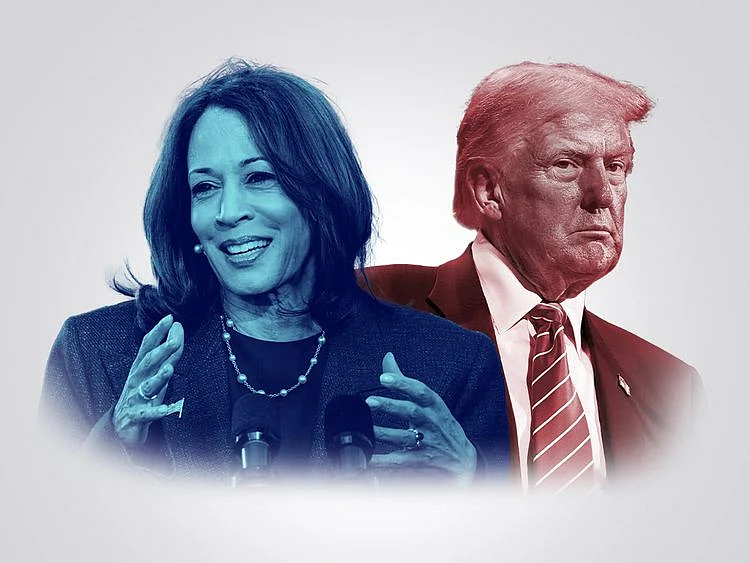US presidential race dangerous extremes clash
Trump’s “America First” or Harris’s continuity America faces its biggest test

Nov. 5, Tuesday, Americans will finally, as we say, get down to the get down and head to ballot box, there to vote — in one of the closest presidential races in decades — either for a man who anchors his bid for a second White House term on fear of an imagined “immigrant invasion” or a woman who promises that, if elected, her tenure in office will simply “represent a continuity of the current administration’s policies”.
Trump, who hopes to to stage the most spectacular political comebacks in American history, recently gave his “closing argument” speech — a term borrowed from the courts that refers to a candidate’s final statement to voters, which aims to package a campaign’s policies in the final days of an election — at a rally in Madison Square Garden, New York City’s cultural icon in the heart of downtown Manhattan, where high-profile speakers who preceded Trump to the podium overshadowed the presidential aspirant’s message (which repeated the same attacks against Harris’s intelligence, again described America as an “occupied country” and emphasised the need to impose stiff tariffs on imports) with their incendiary rhetoric, off-colour jokes and racist comments about Puerto Ricans and their island (an incorporated territory of the United States).
Kamala Harris, meanwhile, gave her own closing argument speech, tellingly, at the Ellipse, the park just south of the White House, where on Jan. 6, 2020, then President Donald Trump directed his supporters to “fight like hell”, which drove thousands of them to march on the Hill and storm the US Capitol, a truly traumatic event in modern American history.
In her speech, intentionally delivered with the White House as backdrop, she slammed Trump; bragged that while he, in his first day in the Oval Office, will arrive there with an “enemies list”, she will do so with a “to-do list”; urged Americans to “turn the page to a new chapter” in American political culture by voting for her; and called America’s “the greatest story ever told” (It is doubtful that African Americans, along with Native Americans, present at the venue nodded to that one.)
Where’s the beef?
OK, Kamala, great. But where’s the beef? Where’s the admission that, in its unconditional support of Israel’s brutalities in Gaza over the last year, America has lost the moral high ground on the global stage? And where’s the pledge to regain it during your administration? Are Arab Americans and Uncommitted Americans to call their choice of a candidate one between the devil and the blue deep sea?
No matter. Harris did remind voters, however, and repeatedly so, of the bleak future that awaited their nation were they to re-elect Donald Trump as their president.
And all this is happening at a time when never in American history had American society radiated such an abnormal vibe, one that speaks of toxic, seemingly irremediable polarisation, deep worries by many about the health of American democracy (a democracy that a new Alexis de Tocqueville would hardly recognise as one), and even the peril of a civil breakdown (say, an overblown Jan. 6 redux).
These are contradictions at the core of American society that a Trump administration will most assuredly sharpen.
As for the outside world, well, Europeans as a whole don’t view him favourably, given that he has vowed to adopt an even more aggressively isolationist “America First” approach to foreign policy than the one he had pursued in his first term, leaving America’s allies on the other side of the Atlantic to fend for themselves.
As far as the Middle East is concerned, people still recall the cavalier way he recognised Israel’s annexation of East Jerusalem and the snap decision he made, after a brief chat with David Friedman, his US ambassador to Israel, and Jared Kushner, his son-in-law, to recognise Israel’s 1981 annexation of Syria’s Golan Heights, thus upending the very fundamental equations that had defined the parameters of the Arab-Israeli conflict for decades. (In April 2019, according to Reuters, he told a gathering of the Republican Jewish Coalition meeting in Las Vegas: “I said [to Friedman and Kushner], ‘Fellows, do me a favour, give me a little history, quick. Want to go fast. I got a lot of things I’m working on’. I went Bing. It was done. I make fast decisions. I make good ones”.) And what new outrage will he commit this time around?
In a few days, America will decide its course, a choice that goes beyond red or blue, Harris or Trump. With a nation divided and tensions high, voters will pick one of the two distinct visions, each carrying significant implications for both domestic and global affairs.
— Fawaz Turki is a noted academic, journalist and author based in Washington DC. He is the author of The Disinherited: Journal of a Palestinian Exile
Sign up for the Daily Briefing
Get the latest news and updates straight to your inbox
Network Links
GN StoreDownload our app
© Al Nisr Publishing LLC 2026. All rights reserved.